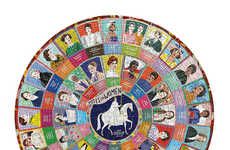
DBS Ask Consumers to Rethink the Fashion Industry in the 'Trash Princess'
Grace Mahas — October 28, 2019 — Social Good
DBS, one of the world's most valuable banks, recently released the 'Trash Princess' inniative that confronts viewers with startling information about the fashion industry including the fact that it's the second-largest polluter in the world -- only second to the oil industry.
It takes place at a runway show were a group of guests discuss the environmental consequences brought forth by fast fashion. The Trash Princess film progresses to showcase a workshop of one of the characters who upcycles post-consumer products to create new garments. For example, there are shorts made from recycled water bottles, a shirt made from used coffee grounds, and a recycled pillow.
As part of its effort to create a sustainable world, DBS launched four sustainability interest groups and also hosts clothing swaps for employees -- so far collecting more than 200kg of donated items.
It takes place at a runway show were a group of guests discuss the environmental consequences brought forth by fast fashion. The Trash Princess film progresses to showcase a workshop of one of the characters who upcycles post-consumer products to create new garments. For example, there are shorts made from recycled water bottles, a shirt made from used coffee grounds, and a recycled pillow.
As part of its effort to create a sustainable world, DBS launched four sustainability interest groups and also hosts clothing swaps for employees -- so far collecting more than 200kg of donated items.
Trend Themes
1. Sustainable Fashion - Creating fashion from sustainable sources to reduce impact on the environment.
2. Circular Economy - Changing the current linear economic model of take-make-dispose to an economy where resources are kept in use for as long as possible.
3. Upcycling - Transforming waste materials to create new, higher value products.
Industry Implications
1. Banking - Opportunities for banks to implement sustainable practices and invest in environmentally conscious companies.
2. Fashion - Opportunities for fashion industry to shift to sustainable practices like upcycling, using natural fabrics and reducing waste.
3. Waste Management - Opportunities for companies in the waste management industry to integrate circular economy principles and work toward zero waste.
2
Score
Popularity
Activity
Freshness















